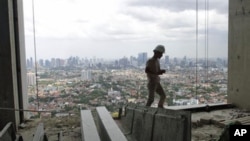After his 2009 landslide re-election, Indonesian President Susilo Bambang Yudhoyono promised prosperity, justice and democracy for all. A year later, while Indonesia is experiencing strong economic growth, progress on other issues has slowed.
Rain delayed the plans of anti-corruption, human rights and labor groups in Jakarta to protest what they are calling the broken promises of President Yudhoyono's second term.
In other parts of Indonesia thousands of people joined anti-government rallies on Wednesday, marking the end of the first year of Mr. Yudhoyono's second term.
In Jakarta several hundred protesters braved the bad weather. Later police fired tear gas to disperse a small group of protesters who turned violent.
Among the demonstrators was Abdulah Hasan with the group Indonesia Corruption Watch. He says the president is failing in a number of areas, first of which is corruption, which is not decreasing but increasing.
A government official said the protesters had every right to demonstrate, but he also defended President Yudhoyono's achievements so far in his second term. He pointed to the president's stewardship over one of the fastest growing economies in the world, a reduction in poverty, and a decisive response to the terrorist attacks of two Jakarta hotels in 2009.
Political analyst Anies Baswedan with Paramadina University gives the president high marks for protecting the peace and promoting prosperity. But he says long-term democratic reforms and development initiatives have stalled so far in the second term.
"Now where is the progress not yet positive? It is on the legal and judicial component. If you look at the office of Attorney General, the office of the National Police, the court system, all of this, the progress is rather [at a] minimum."
Baswedan adds the president's landslide election victory a year ago may have isolated him politically, making it more difficult to push through his legislative agenda.
In his first term the president, who heads the Democratic Party, had Joseph Kalla, the head of the powerful Golkar Party, as his vice presidential running mate. That, Baswedan says, made the two parties work together.
"Today that is not present. In fact, the two largest political parties often were in the outside of his policies or in opposition to his policies. It creates a new equilibrium, very different than the first term," observes Kalla.
On efforts to curb corruption, particularly, the president has had to move more slowly than many voters and activists had hoped.
Teuku Faizasyah, a special assistant to the president, does not dispute that President Yudhoyono, who is known as a cautious consensus builder, has met stiffer resistance in Parliament than expected.
"It is always difficult in terms of [the] Indonesian political system. He gained majority support in terms of direct elections but the political reality we see, the Parliament is composed of a lot of political party figures. We need the support of Parliament in implementing program projects,” says Faizasyah.
The president's go-slow style frustrates many who want to see immediate reform. But his supporters say that in a democracy as vast and diverse as Indonesia, which consists of thousands of islands, many different ethnic groups and cultures, and has the fourth largest population in the world, change does not come easy.





